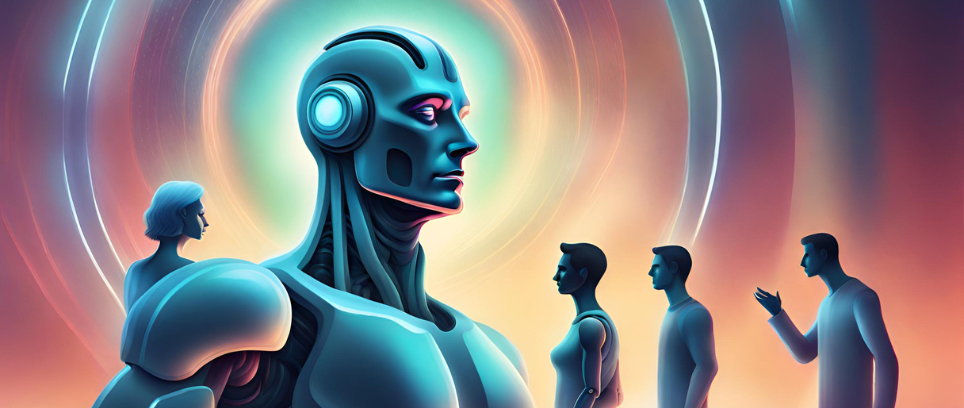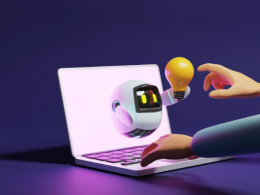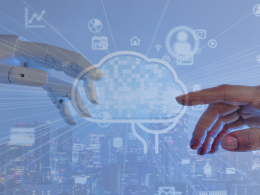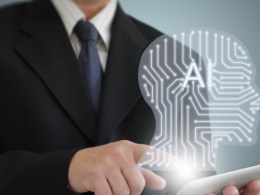Introduction: Demystifying Artificial Intelligence
As we stand on the cusp of a new era facilitated by AI tools like ChatGPT, Midjourney, and Whisper AI, it’s essential to delve into the intricacies of Artificial Intelligence (AI).
Beyond the mystique, AI is a transformative technology that has made significant strides, impacting various aspects of our lives.
This comprehensive guide aims to unravel the layers of AI, exploring its definition, limitations, potential, and the ongoing debate about whether AI can truly replace human intelligence.
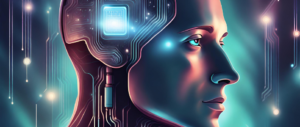
What is AI?
In simple terms, AI refers to the technology enabling machines to emulate human-like intelligence.
This includes tasks such as recognizing patterns, making decisions, and processing natural language.
The backbone of AI lies in machine learning algorithms, allowing systems to learn and evolve over time, adapting to new information.
The Limits of AI
While AI is making remarkable strides, it’s crucial to acknowledge its limitations.
The efficacy of AI is directly tied to the quality of the data it’s trained on. If the data is biased or incomplete, the AI system reflects those biases, raising ethical concerns.
Additionally, AI falls short in the realm of true creativity and innovation. Unlike humans who draw on intuition, inspiration, and imagination, AI generates solutions based on algorithms and existing patterns.
What is AI’s Potential?
Despite its limitations, AI holds immense potential to revolutionize industries and address global challenges.
Industry visionary Andrew Ng highlights the transformative impact of AI across sectors like healthcare, education, transportation, retail, communications, and agriculture.
Let’s explore how each of these industries stands to benefit from the transformative power of AI.
1. Healthcare
AI’s impact on healthcare is profound, driven by its ability to analyze vast datasets and recognize intricate patterns.
In diagnostics, AI can enhance accuracy by rapidly processing medical images and identifying subtle anomalies. Moreover, predictive analytics powered by AI assists in anticipating disease outbreaks, enabling proactive measures for public health.
The fusion of AI and healthcare holds the promise of personalized medicine, tailoring treatments based on individual patient data.
2. Education
In education, AI is reshaping the landscape by offering personalized learning experiences.
Adaptive learning platforms leverage AI algorithms to assess students’ strengths and weaknesses, tailoring lesson plans accordingly. Virtual tutors powered by AI provide additional support, adapting to each student’s pace and learning style.
As a result, education becomes more inclusive and effective, addressing individual needs and fostering a deeper understanding of complex subjects.
3. Transportation
AI’s integration into transportation is evident in the development of autonomous vehicles and smart traffic management systems.
In the realm of autonomous driving, AI algorithms process real-time data from sensors and cameras, ensuring safer navigation. Traffic optimization, another facet of AI in transportation, alleviates congestion and enhances overall efficiency.
With AI at the helm, transportation is evolving towards a safer, more sustainable, and smarter future.
4. Retail
Retail experiences are undergoing a revolution, thanks to AI’s ability to analyze consumer behavior and preferences.
AI-driven recommendation systems provide personalized product suggestions, enhancing the overall shopping experience. Inventory management becomes more efficient with predictive analytics, minimizing stockouts and overstocks.
Chatbots powered by AI facilitate seamless customer interactions, offering quick responses and enhancing customer satisfaction.
5. Communications
In the realm of communications, AI is streamlining interactions and improving efficiency. Natural Language Processing (NLP) enables AI to understand and respond to human language, facilitating chatbots and virtual assistants.
AI-powered language translation tools bridge communication gaps, fostering global collaboration.
As AI continues to evolve, it holds the potential to enhance real-time language processing, making communication more intuitive and effective.
6. Agriculture
AI is making significant inroads into agriculture through precision farming techniques. AI algorithms process data from various sources, including satellite imagery and sensors, to optimize farming practices.
Precision agriculture enables farmers to make data-driven decisions on irrigation, fertilization, and pest control, leading to increased crop yields and sustainability. AI-driven agricultural solutions contribute to efficient resource utilization and environmentally conscious farming practices.
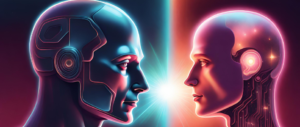
The Importance of Human Element in AI – Why It Matters
In the technological landscape, Artificial Intelligence (AI) emerges as a powerful tool, yet it is not a replacement for human intelligence. While AI excels in data analysis and pattern recognition, it lacks the nuanced attributes of human intellect—genuine creativity, intuition, and a holistic understanding of complex social dynamics.
Humans bring an ethical compass, empathy, and societal understanding that AI inherently lacks. Diverse human experiences enrich decision-making whereas AI which is devoid of personal touch and lived experiences, cannot fully comprehend.
Rather than a replacement, a collaborative approach is key. AI, with its computational speed, augments human intelligence, providing insights and automating routine tasks. This collaboration allows humans to focus on emotionally intelligent, creative, and nuanced tasks.
Responsible AI usage is paramount. Human oversight ensures alignment with ethical standards and societal values. Establishing guidelines and legal frameworks safeguards against unintended consequences, fostering responsible and fair AI applications.
The Future of AI and Human Intelligence
Peering into the future, AI is poised to advance further, becoming even more sophisticated. However, certain tasks that demand human input, creativity, and emotional intelligence will persist.
Professions like physicians, teachers, HR professionals, and business leaders involve nuanced human interactions and decision-making, resisting complete automation. AI is set to enhance productivity in these roles, working in tandem with human intelligence.

